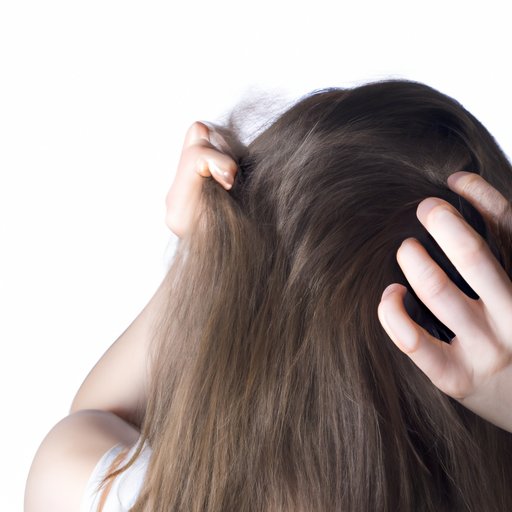Introduction
Itchy hair can be an annoying and sometimes painful problem that many people suffer from. It is defined as a feeling of discomfort on the scalp due to irritation or dryness. Although itchy hair is not usually a sign of a serious medical condition, it can still be bothersome and interfere with daily activities. In this article, we will explore why your hair may be itchy and what treatments you can try to find relief.

Identifying Possible Causes of Itchy Hair
There are several potential causes for itchy hair. Some of the most common include allergens, environmental factors, stress, and improper hair care.
Allergens
Allergens are substances that can cause an allergic reaction when they come in contact with the skin or are inhaled. Common allergens that can cause itchy hair include dust mites, pet dander, pollen, mold, and certain foods. Allergens can also be found in some hair products, such as shampoos and conditioners.
Environmental Factors
Environmental factors, such as humidity, temperature, and air pollution, can also contribute to itchy hair. In dry climates, the scalp produces less sebum (the body’s natural oil) which can lead to dryness, irritation, and itching. A change in climate can also trigger an allergic reaction, which can cause itchy hair.
Stress
Stress can also cause itchy hair. When we are stressed, our bodies produce hormones that can affect our skin and scalp, leading to dryness, irritation, and itching. It is important to manage stress levels in order to keep the scalp healthy.
Improper Hair Care
Improper hair care can also cause itchy hair. Using too many styling products, washing the hair too frequently, or using harsh chemicals can all contribute to dryness and irritation. It is important to use mild shampoos and conditioners, and to avoid excessive heat styling.
Exploring Treatments to Relieve Itchy Hair
Once the cause of the itchy hair has been identified, it is important to find a treatment that works for you. There are both over-the-counter medications and natural remedies that can help to relieve itchy hair.
Over-the-Counter Medications
Over-the-counter medications such as antihistamines and hydrocortisone creams can help to reduce inflammation and itching. These medications can be purchased at most pharmacies without a prescription.
Natural Remedies
There are also several natural remedies that can help to relieve itchy hair. Applying coconut oil or aloe vera gel to the scalp can help to soothe irritation and moisturize the scalp. Tea tree oil can also be used to reduce itching, as well as to treat dandruff. Other natural remedies include apple cider vinegar, honey, and lemon juice.
Examining the Benefits of Natural Hair Care Products
Using natural hair care products can also help to reduce itchy hair. Natural products are free of harsh chemicals that can irritate the scalp and strip away natural oils. They are also better for the environment and can help to promote healthier hair.
Moisturizing
Natural hair care products can help to keep the scalp and hair moisturized. This can reduce dryness and irritation, which can lead to itching. Coconut oil, shea butter, and jojoba oil are all excellent natural moisturizers.
Avoiding Harsh Chemicals
Harsh chemicals, such as sulfates, parabens, and synthetic fragrances, can irritate the scalp and cause itching. Natural hair care products are free of these chemicals and can help to reduce itching.
Stimulating Scalp Circulation
Some natural hair care products contain ingredients such as peppermint oil or menthol that can help to stimulate circulation in the scalp. This can help to promote healthier hair growth and reduce itching.

Investigating Allergens That May be Causing Itchy Hair
If you suspect that an allergen is causing your itchy hair, it is important to identify and eliminate the source. Common allergens that can cause itchy hair include pollutants, certain foods, and hair products.
Pollutants
Pollutants, such as smoke and car exhaust, can settle on the scalp and cause an allergic reaction. It is important to avoid areas with high levels of air pollution, and to wear a hat or scarf when outdoors.
Foods
Certain foods, such as dairy products, eggs, wheat, and soy, can cause an allergic reaction. If you suspect that a food allergy is causing your itchy hair, it is important to avoid the food and seek medical advice.
Hair Products
Hair products, such as shampoos and conditioners, can also contain allergens. It is important to read the labels of products before using them, and to switch to natural products if necessary.

Understanding the Importance of Regular Hair Maintenance
It is also important to maintain healthy hair through regular cleaning and conditioning, trimming split ends, and avoiding heat styling. These practices can help to keep the scalp healthy and reduce itching.
Cleaning and Conditioning
It is important to use a mild shampoo and conditioner that are free of harsh chemicals. These products should be used regularly to keep the scalp clean and nourished.
Trimming Split Ends
Split ends can cause itching and irritation. It is important to trim split ends regularly to keep the hair healthy.
Avoiding Heat Styling
Heat styling tools, such as curling irons and blow dryers, can cause damage to the hair and scalp. It is important to avoid these tools when possible, and to use a heat protectant if necessary.
Conclusion
Itchy hair can be caused by a variety of factors, including allergens, environmental factors, stress, and improper hair care. There are both over-the-counter medications and natural remedies that can help to relieve itchy hair. Additionally, using natural hair care products can help to reduce itching and promote healthy hair. It is also important to maintain healthy hair through proper cleaning and conditioning, trimming split ends, and avoiding heat styling. If you are still experiencing itchy hair after trying these treatments, it is important to seek medical advice.


